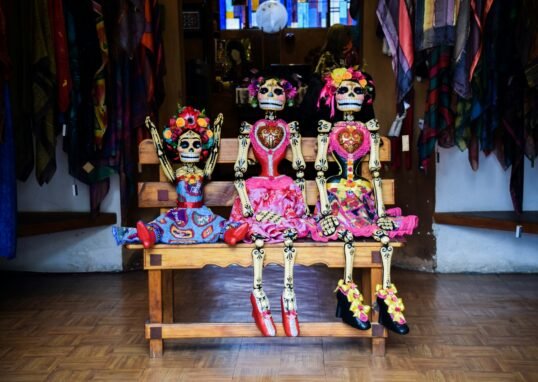
So, you’re contemplating life under swaying palm trees, affordable living, and the warmth of Mexico.

I get it—moving abroad sounds like a dream, especially after 40 when life’s priorities shift, and you’re laser-focused on health, financial freedom, and overall happiness.
But here’s the thing, if you’ve been a nurse like me (or in any call-heavy, stress-laden profession), you’ve likely asked yourself this one daunting question:
“What about healthcare?”
When I was young and carefree, I rarely (if ever) thought about where the nearest doctor was or how I was going to get care whenever I traveled.
But now that I’m older, I am acutely aware that having access to consistent and quality healthcare is not just an option.
It’s a non-negotiable.
We’ve been conditioned to believe great healthcare comes with high costs and endless paperwork, but guess what?
Mexico has some delightful surprises for you.
As a nurse with over 20 years of experience in the U.S. system, I was floored by how healthcare operates south of the border.
Not only is it affordable, but it sound like stepping into a concierge service for my health!
In this post, I’ll share five things you might appreciate before your first visit to Mexico.
Whether you’re planning a move abroad or just want to know if a Mexican retirement plan is viable, these insights will give you clarity—and maybe even calm your what-if nerves.
1. Healthcare Can Be Affordable and High Quality

Let’s not sugarcoat it—one of the biggest fears of living abroad is whether healthcare will measure up to what you’re used to in the U.S.
(Let’s face it, the bar isn’t that high some days, right?)
But in Mexico, I was blown away by how affordable and accessible care truly is.
Here’s the breakdown:
–Private Healthcare: Mexicans and expats alike often use private healthcare because it offers shorter wait times and direct access to specialists.
The cost?
A fraction of what you’d expect.
For instance:
– A consultation with a specialist: $30–$50 USD.
– Lab work or X-rays: Around $25–$60 USD.
– Medications: Many can be purchased over the counter (more on that in point #3!).
– Public Healthcare Systems: Mexico offers two major systems—INSABI (general public care for Mexican citizens and residents, which is free for most services) and the IMSS (Mexican Social Security Institute), which provides care to workers and residents who pay into the system.

While public hospitals may have longer wait times, the quality of doctors and staff is often excellent.
Many expats, especially retirees, combine private insurance with occasional use of the public system.
It’s budget-friendly and flexible—no more endless calls to insurance companies fighting for coverage.
You might also like: 5 Jaw-Dropping Truths About Mexican Healthcare (It Ain’t Just About Margaritas)
2. Doctors in Mexico Take Their Time
Raise your hand if you’ve ever felt rushed during a doctor’s appointment in the U.S. (probably everyone).
One of the most surprising things about healthcare in Mexico is the luxury of time.
On average, appointments are longer and much more personal.
Mexican doctors prioritize listening to you—not the clock.
I’ve stalked Mexican expat groups and blogs for years and have paid close attention to poster’s accounts on their healthcare experiences.
I’ve read of initial consultations lasting 45 minutes, during which the doctor asked thoughtful questions about lifestyle, stress levels, and overall habits.
At one point, I remember silently thinking, Are these exams or a therapy sessions?

Why does this happen?
Of course, I had to have more information which led to more research.
I had to understand the Mexican system.
Many private doctors run their own clinics, meaning they can control their schedules without insurance companies meddling.
It was such an eye-opening experience—it reminded me of the care that we used to get back in the days when doctors had to the time to care about your well-being (and not about hitting their daily patient quota).
3. The Pharmacy System Will Shock You

Do you know how exhausting it feels to navigate endless steps just to refill a prescription?
In Mexico, pharmacies are a game-changer.
Many medications are available over-the-counter (seriously, no doctor’s note required), and they’re far more affordable than in the U.S.
For example:
– Antibiotics, blood pressure meds, and even inhalers can be purchased directly at a pharmacy.
– Pharmacists are highly trained; they’re often willing to provide guidance on dosages and recommendations right there in the store.
However, for controlled substances—think pain medications or specialty drugs—you’ll still need to consult a physician.
While this might seem too relaxed to some, rest assured that patient safety is still a priority.
In my experience, the accessibility would be a huge relief and a wallet-saver for minor illnesses and maintenance medications.
4. Preventative Care is Surprisingly Accessible
Sometimes, taking the proactive route to your health can feel ridiculously unattainable in the U.S.
(“You want me to schedule a wellness check in 9 months? Sure, if I’m still alive by then!”).
But in Mexico, preventive care isn’t just encouraged—it’s baked into the system.
Some standout examples:
– Walk-In Clinics: Almost all major pharmacies (like Farmacias Similares or Farmacias del Ahorro) have walk-in clinics attached. You can pop in without an appointment for routine checkups, vaccinations, or advice.
– Affordable Health Screenings: It’s possible to get an entire blood panel done for as little as $25. And trust me, you won’t need to battle with insurance approvals first.
This emphasis on prevention is something that resonated deeply with me.
With an affordable healthcare infrastructure, taking care of yourself feels less like a financial burden and more like second nature.
5. You Might Get Spoiled By Medical Tourism
If you’ve heard the term “medical tourism,” let me tell you—it’s not just a trend.
Mexico is a hotbed for affordable, high-quality procedures that cost up to 70% less than what you’d pay in the United States.
Popular examples include:

– Dental Work: I’ve met expats who travel to Mexico every year just for dental treatments. Full cleanings start as low as $20, and crowns or implants cost significantly less.
–Cosmetic Surgery: Procedures like facelifts, tummy tucks, and Botox are incredibly popular among expats and are completed by experienced professionals at state-of-the-art facilities.
–Specialized Surgeries: Orthopedic surgeries (knee and hip replacements) and bariatric surgeries are common among medical tourists.
Mexico is home to internationally accredited hospitals with English-speaking staff, which adds to the appeal.
And let’s not forget—you can recover in a beachside Airbnb with a margarita in hand.
What This Means for Women Over 40
Let’s face it—as we get further along in life, our health becomes non-negotiable.
Whether you’re planning a retirement abroad, considering part-time living in Mexico, or seeking a place for affordable care, the Mexican healthcare system deserves your attention.
Here are my practical tips if healthcare is a priority in your move abroad journey:

1. Research Local Healthcare Options: Look up private clinics and public hospital reviews in the area you’re considering.
2. Invest in Private Health Insurance: Many international companies (like Allianz or IMG) offer affordable global plans tailored to expats. It’s worth the peace of mind.
3. Try Medical Tourism First: Schedule non-urgent appointments in Mexico while traveling to see if you vibe with the system.
In a Nutshell
Moving abroad, especially after 40, is an exciting chapter—but it’s not without its challenges, especially when it comes to planning for healthcare.
The good news?
Mexico offers world-class care at a price your bank account will love.
Whether you’re a nurse considering leaving the U.S., an expat wannabe looking for a fresh start, or just someone tired of the U.S. healthcare circus, Mexico proves that affordable healthcare doesn’t mean sacrificing quality.
Are you considering moving abroad?
Have any health-related concerns or questions?
Let me know in the comments—your next adventure might just be one question away.
Salud! ✈️ 🌴
Check out these superb reads:





